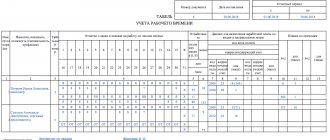24.06.2019
0
700
5 minutes.
Currently, the term “time off” is excluded from Russian labor legislation. Instead, the concept of additional days off or a short vacation period applies. They are carried out at the expense of the employee. If for one reason or another a person needs free time, he writes an application for time off with subsequent work. The employer decides whether to sign it or not. However, there are situations, as well as groups of workers, in respect of which refusal is impossible.
The legislation establishes this form of relationship as an agreement between the parties, but individual organizations prescribe it in their charter. Typically, this will explicitly state the requirement to notify management in advance and work the allotted time, either before or after the days provided. Most people sooner or later face the need to take time off, so this procedure is well established in organizations.
Legislation
Let's look at some articles of the labor code.
In cases where the employee justifies the termination of the employment contract by the impossibility on his part to continue working, the employer is required to organize the dismissal of the employee within the period specified by the employee (Article 80):
- Admission to the University.
- Retirement age.
- Change of residence due to a change of job of the spouse.
- Other valid reasons.
- In cases of established violation on the part of the employer (if such a violation occurred, then it is necessary to prove it, but a decision on the claim will be made by the authorized bodies within two weeks).
An employee who decides not to continue the employment relationship during the probationary period must notify the manager about this in writing three days in advance (Article 71).
And employees who have signed an employment contract for a period of up to two months are required to notify the employer three calendar days in advance of their intention to terminate the employment relationship (Article 292).
As a rule, an employee under a fixed-term contract must work for 2 weeks. An exception is if a fixed-term contract is concluded for a period of less than two months, then notice of dismissal should be given three days in advance (Article 79).
There is also article 348.12, relevant for athletes and coaches, which, on the contrary, increases the period of work to a month. This rule also applies to management positions. If the contract is signed for a period of up to 4 months, then this law does not apply.
Admission to the University
The Labor Code does not explain the form of training in an educational institution. Therefore, Article 80 can be used by students enrolled not only in full-time (full-time) studies, but also in correspondence or evening courses. In this case, the student must provide a certificate of enrollment at the university. The application must indicate the reason for dismissal “enrollment in an educational institution.”
Retirement age
As for employees who have just retired or are already pensioners, but have not used their right to retire. Both have the right to quit without prior warning to the employer (Article 80).
But how many times a pensioner can use this opportunity is a moot point. Judges' decisions on this issue differ. Some judges believe that an employee of retirement age can use the right not to work for two weeks only once (case No. 33-842 of 04/11/2012). And some, on the contrary, believe that a pensioner can use this privilege an unlimited number of times (case No. 33-2143 of 04/06/2011).
Other valid reasons
The third paragraph in Article 80 “other good reasons” is very controversial. To date, the legislation does not have a complete, clear list of specific valid reasons (only pension, study, relocation of a spouse, violation of labor laws by the employer). Therefore, the decision about your ability or inability to continue working remains with management.
As an alternative, you can go on vacation or take sick leave. You give notice of your intention to quit 2 weeks in advance, but during these two weeks you do not work, but go on vacation or take out sick leave (for example, sick leave for pregnancy).
Emerging nuances
Having received an employee’s application for time off with subsequent work, the employer can grant it.
In this case, he will have to issue an appropriate order and familiarize the employee with it.
Make the necessary adjustments, both to documents and directly to the work process itself due to the absence of an employee.
Important! When applying for time off with subsequent work, you must indicate a specific reason why the employee needs it.
If the day off is taken into account for time already worked, then it is not at all necessary to explain the reason.
Although some employers even in this situation show increased curiosity.
Whether or not to answer questions if a day has already been worked is the employee’s right. In the latter case, the day off will still be provided.
Sometimes it is much easier to take a day without pay than to take time off with work.
For example, in some situations, the employer will not be able to refuse to provide leave without pay, and its duration may even be 1 day.
Regardless of the reasons for absence from work, the employer's consent must be obtained.
Otherwise, it may be regarded as absenteeism and the employee may be subject to disciplinary action, including dismissal.
In fact, the employer’s consent will be considered received only after the relevant decree is issued.
Important! Sometimes companies independently develop a form for applications for time off.
This is permissible by law and it is recommended in this case to resort to filing an appeal in accordance with the rules adopted by the organization.
Standard forms and procedures for processing applications are established in order to simplify and make internal document flow more understandable.
This opportunity is often used by large companies, where there are thousands of employees and it is easier to process standard applications.
It is worth knowing that in large organizations it is required to first coordinate an application for time off with the employee’s immediate superior, for example, a foreman or department head.
Only after this the application can be submitted to the management of the organization. Sometimes there may be several stages of approval.
Legal basis
Issues of providing additional days off or vacations are regulated by the Labor Code of the Russian Federation.
But often the employee’s rights in this regard are significantly expanded and are specified in the employment, collective agreement or other internal regulatory documents of the employer.
Each employee is introduced to them upon employment upon signature or subsequently when the relevant orders are issued.
If you have any questions about taking time off, you should contact the organization’s accounting department or human resources department.
Representatives of trade unions can also clarify some points. But this last point usually applies only to large organizations. In small firms, most often no one talks about any trade unions.
Main concepts
Russian legislation got rid of the concept of time off quite a long time ago. Instead, an additional day off, various types of vacations, etc. are used. But this did not change the essence.
If in the application an employee asks for time off, this will not cause any surprise or indignation. Everyone will perfectly understand his message and arrange a day off according to the rules of the law.
An additional day off can be provided on account of time already worked, with subsequent work, or without pay.
In a situation where the employee has already gone to work on his day off and has not yet received monetary compensation for overtime, the employer will not be able to refuse to provide time off.
The employee’s application must be reviewed by the employer. The decision taken on it is usually formalized in the form of an order.
After its publication and the employee’s familiarization with it, it is binding, including for the employer’s management.
In what cases is it provided?
In fact, Russian legislation establishes that time off with subsequent work can be provided to an employee simply by agreement with the employer.
There are no restrictions on the existence of any grounds for receiving it. But there is one condition: the employer’s consent is required.
Without it, you won’t be able to take a day off, and unauthorized absence may be considered absenteeism.
The main reasons employers accept for providing time off are:
| Various family circumstances | preparing the child for school, visiting relatives |
| The need to visit government agencies | for processing various documents |
| visit to the doctor | — |
The situation with time off without pay is somewhat different. In this case, there are circumstances in which the employer is obliged to provide them:
- death of a close relative;
- birth of a child;
- wedding.
What categories of workers
Any employee can apply for time off for future work. But this does not mean that the employer will necessarily satisfy her.
It is quite possible that right now he cannot provide an additional day off for various reasons, for example, due to production needs.
There are no preferential categories of employees in this case.
The situation is completely different with leave without pay. It can be issued even for one day.
The employer will not be able to refuse to provide such time off to a number of employees, provided that the maximum number of days used per year is observed.
Let's consider which category of employees the employer will be required to provide time off without pay:
- pensioners;
- disabled people;
- WWII participants;
- parents and spouses of those killed in the performance of their military duties.
Is refusal possible?
Providing time off with subsequent work is the employer’s right, but not an obligation.
He may have his own plans, which he has no particular desire to violate.
It is for this reason that it is imperative to indicate in the application for time off with subsequent work off the reason why the employee requires it.
If she is respectful enough, then the employer will probably be able to accommodate her halfway.
The situation is similar with leaves without pay. Only if the employee has certain circumstances or is classified as a preferential category will the employer be able to refuse to provide him with a day off.
Video: vacation at your own expense, if we agree
Vacation registration
To avoid processing you can use:
- main leave;
- leave without pay (wages).
If paid annual leave is less than two weeks, then you will have to take leave without pay.
But to take a vacation at your own expense, you need good reasons. List of reasons mentioned in the labor code:
- disability (Article 128);
- participation in the Great Patriotic War (Article 128);
- studying, passing exams (part-time, part-time, full-time education) (Articles 173, 174);
It is important to note that the employer may refuse legal leave if it was not recorded in these numbers in the leave schedule.
An application for leave along with dismissal is drawn up according to the template of a regular application.
At the top (in the header of the document) the position of the manager (to whom the application is addressed), the name of the company, surname (in the dative case) and initials of the manager are indicated, then we write our position, full name (in the genitive case).
After that the word “Statement” is written.
Below is the application itself with a request for annual paid leave or leave at your own expense, indicating the period, duration and reason for subsequent dismissal. The day of dismissal is considered the last day of vacation. At the bottom of the application is the applicant’s signature, transcript and number.
Sample application for “leave followed by dismissal.”
Gene. Director of Umka CJSC Grinko G.N.
From an assistant accountant
Smirnov Oleg Valerievich
Statement
Please provide me with annual paid leave from 06/01/2015 to 06/14/2015, lasting 14 calendar days, followed by voluntary dismissal.
05/29/2015 Smirnov
In an application for leave without pay followed by dismissal, you must indicate the reason for the need for leave:
I ask you to grant me leave without pay from 06/01/2015 to 06/14/2015, lasting 14 calendar days, due to caring for my seriously ill mother, with subsequent dismissal at my own request.
The application is drawn up either in printed form or written by hand by the employee on A4 sheet. Based on it, two orders of the manager are issued. The first order is about leave, the second is about dismissal.
To take leave at your own expense for a valid reason, you must attach a supporting document.
sample application for “leave with subsequent dismissal” in MS Word format.
Providing a day of rest
Any worker can send his manager a request for a temporary interruption of professional activity that is not planned in the vacation schedule.
Most often this can happen in two cases.
First of all, a person makes a petition of this kind in the case when he previously worked during a non-working period, that is, he used his personal time not for rest and recovery, but to perform the duties of his position. Accordingly, in such circumstances, anyone wants to compensate for costs of this kind. According to the general rules, a worker may not receive monetary compensation, but can take time off from work, that is, use it for its intended purpose - for rest and recovery.
Another opportunity to receive time off is the obligation of a person, which he undertakes on his own initiative, to work out the established working period in the future. Most often, this happens in cases where unforeseen problems arise that require immediate solutions, for example, organizing the funeral of a relative.
With subsequent processing
An application for time off can be sent to the manager with the condition of subsequent work. In this case, the boss is empowered to provide the days the person needs. Most often, such an initiative is facilitated by the emergence of unexpected problems.
An interested initiator needs to be prepared for the fact that the manager may refuse the request. The exception here is if the worker is included in a preferential category or the need is caused by valid reasons of a personal or family nature, for example, marriage or the passing of a relative.
In other cases, the person will be required to work out the days used, since his absence negatively affects the established frequency of work.
Taking into account the above, the manager needs to determine the time during which the person will be required to work off the used time off.
The worker should understand that future work will take place in his personal time. That is, he will have to work either overtime or on a day that is a non-working day, according to the established work schedule.
For previously worked time
The situation with granting time off for previously worked time is somewhat different. This procedure is typical for situations where a person worked on a personal day off or after the end of a work shift, that is, overtime.
Most often, this happens at the direction of the manager, when it is necessary to complete work, the volume of which is quite significant, and the main time for this is simply not enough.
Engagement in labor in these circumstances is always accompanied by the execution of an order from the head of the organization of the appropriate nature. It is this document that reflects the type of compensation for personal time that was used for other purposes. That is, it is agreed in advance that a person can take time off at any time convenient for him. The order may also stipulate specific dates for such a period.
It should be noted that in this case, refusal on the part of the manager is not allowed. In other words, if the parties agreed in advance on this type of compensation and this is reflected in the content of the order, then the worker must be given time off.
Types of applications for leaving without work
There are 3 options:
Writing a statement indicating a valid reason;
The application has a standard form. It must contain information about the period of dismissal. “On such and such a date” is indicated, not “from such and such a date,” to avoid confusion. And the reason for dismissal without work.
“I ask you to dismiss me voluntarily on 06/01/2015 due to retirement.”
With supporting documents attached. And be sure to indicate below: number, signature, decoding.
Writing an application for leave with subsequent dismissal;
You may write two separate statements. The first application is for leave, and the second is for dismissal.
Or write in one application “Please provide me with annual paid leave from 06/01/2015 to 06/28/2015, lasting 28 calendar days, followed by dismissal at my own request.”
Writing a statement with the wording: “I ask you to fire me on such and such a date”;
“I ask you to dismiss me voluntarily on 06/01/2015.”
It's a little more complicated here. This will mark the fact that you are quitting your job yourself, that is your intention. The last word remains with the employer. Try to terminate the contract by agreement of the parties.
Rules for drawing up an application
Before getting the desired days, a person must write an application addressed to the head of the organization. The exception is the situation if the dates of leave were agreed upon in advance.
There is no clear sample of a petition of this nature defined by the current regulations. The only mandatory condition is its written form.
Some companies, for convenience, develop ready-made forms that are filled out by interested workers. However, you can also use regular office paper.
The text of the appeal must include the entire comprehensive amount of information that reflects the essence of the request.
According to established practice, it would be correct to reflect:
- Name of the organization;
- information about its manager – surname and initials;
- information about the compiler - full last name, first name and patronymic, position held;
- the reason for the appeal, that is, the period that the person worked in his personal time or that will be worked in the future, indicating the exact dates;
- the nature and description of the circumstances that caused such an initiative; this data is relevant in the event of unforeseen life situations;
- date of document preparation and personal signature of the initiator.
Dismissal by agreement of the parties
The law provides for the right to dismiss an employee by agreement with the employer. This means that if the employer is not against your leaving without working, then you can quit on the same day that you indicated in the application. But this depends on the situation and relationship with the leader.
Deadlines for notifying an employer about dismissal according to the Labor Code of the Russian Federation
The deadlines for working out vary. The Labor Code specifies these cases in several articles. List of cases in which three-day work is established:
- If the employee is still on probation. During the probationary period, the employee has the right to resign after working for 3 days (Article 71). Information about the probationary period must be specified in the contract. If this is not stated, then there is no probation and this law does not apply.
- If the contract is concluded for less than two months. A temporary employee who got a job for up to two months, on the basis of Art. 292, has the right to resign before the end of the contract with three days of work.
- If the mercenary performs seasonal work. According to the Labor Code, this type of contract can be concluded for no more than 6 months. Accordingly, the work is three days.
Conclusions:
- You can terminate an employment contract at your own request on the day the application is written, if there is a good reason with a supporting document.
- Retired employees may resign without service at any time after retirement.
- It is allowed to work no more than three days during a probationary period, seasonal work, or a fixed-term contract.
- If there is no good reason for dismissal without work, you can not work for two weeks, but go on vacation (paid or unpaid) or take out sick leave.
- If the vacation was not dated on the required date in the vacation schedule, then management has the right to refuse vacation.
- By agreement with the employer, you can quit in one day.
- Work must be handled responsibly, since leaving without warning may be regarded as absenteeism.
- Dismissal without service only applies to employment relationships. If a civil contract has been concluded, then there are no such deadlines.
What is meant by time off?
The current general rules and regulations do not contain such a concept as time off at all.
It was formed based on established practice. Its official name sounds like leave without pay. Every worker can ask the manager to provide this time, regardless of his position and the specifics of his professional activity. A special feature of this period is the fact that in this case, during the interruption of professional activity, earnings will not be accrued due to the fact that the person does not actually fulfill his duties. But at the same time he is not relieved of his position.
For each worker, a standard amount of time is determined that he must work in order to receive money in the future.
If a person needs to resolve his personal issues during such a time, then he can temporarily interrupt his professional activities in agreement with the head of the company. This is called time off. Moreover, this can be realized both by working out the established norm, and by taking on the obligation to work it out in the future.
In what cases is such a day off granted?
If we consider the concept of time off from an accounting point of view, we can distinguish between two concepts:
- Paid time off is provided only when the time off is counted towards vacation. Accordingly, this day will be recorded as a vacation in the time sheet. In cases where a day off is granted for overtime, then overtime pay will be accrued on the date the person worked. Time off for work outside of working hours is not paid.
- An unpaid day off is a vacation at your own expense. The employee has the right to take up to 5 days off (continuously); wages are not accrued for this period.
Time off is granted in the following cases:
- for working hours overtime;
- when processing working time during a rotational work schedule;
- for going out on holidays and weekends;
- for business trip days that fell on weekends (departure and arrival times should also be included in this period).
- on account of paid leave;
- day off without pay.
These types of days off are indicated differently in the time sheet.
According to Article 91 of the Labor Code of the Russian Federation, the working day should not be more than 8 hours, i.e., the total working time per week can be a maximum of 40 hours. If a person works in shifts or on a rotational basis, then the minimum number of working hours must be specified in the employment contract.
Employees whose work involves hazardous conditions must have their working hours reduced; labor standards and permissible shift lengths are indicated in special approved industry reference books.
The opportunity to take time off during working hours is described in the following video:
Is it possible to count towards annual holidays not taken?
An employee must take annual leave annually, but if the days are not used, then it can be transferred to the next year.
If the vacation is not used next year, then this is already a violation of the Labor Code of the Russian Federation for the employer, this cannot be allowed.
If such a situation occurs, the employee does not lose vacation days and can use them later or receive monetary compensation upon dismissal.
Unused vacation days can be taken while working. The dates for their provision must be agreed with the manager. To do this, you must submit an application and wait for the manager’s consent.
To request time off to account for unused labor leave, you need to write an application containing the following information:
- position and full name of the manager - the request is made to him;
- information about the applicant;
- Title of the document;
- please provide a day off with pay towards unpaid annual leave;
- dates when time off is needed, their quantity;
- reason for the request - if possible, you need to indicate a valid and important reason, since by law the employer is not required to provide paid time off for rest at times other than those indicated in the schedule;
- applicant's signature;
- Date of preparation.
The applicant must understand that by asking for days off with pay, he loses the opportunity to use the work holiday in full later.
How to apply for an advance payment with subsequent payment?
It is possible that the employee has not worked enough time to qualify for paid leave; in this situation, there is also a chance to receive time off, but they will be provided in advance.
When leaving for rest in advance, the employee must guarantee their subsequent work. Each month worked gives the right to 2.33 vacation days.
How exactly an employee guarantees the fact of subsequent work is decided by the manager and the employee individually.
Perhaps the director will take his employee’s word for it, perhaps some kind of letter of guarantee will be drawn up.
If an employee decides to quit without working for the required period, it will be possible to withhold vacation pay paid in advance only within 20% of the calculation upon dismissal.
The remaining overpayment of vacation pay can only be withdrawn with the consent of the worker himself.
In order not to risk their money, the employer should be confident in the person’s integrity and the degree to which his intention is realistic to work off the paid time off received in advance.
The first step in applying for time off in advance is for the employee to write an application.
The text must be written correctly, addressed to the manager.
It is recommended to indicate a valid and truthful reason for the need for days off, this will increase the chances of approval.
The text should be certified with a personal signature and submitted to the personnel department.
If there are supporting documents, they are also attached to the application.
If the employer refuses
The employer has every right to refuse to provide time off (in advance or at the expense of unused vacation days), so you should not be surprised by the refusal.
The Labor Code of the Russian Federation requires that the employee rest at a pre-planned time in accordance with the schedule.
All deviations are discussed by the parties.
If, after submitting an application, a person receives a refusal, then one should not despair. You can ask for time off without saving your earnings; the chances of getting them may be higher than for annual leave.
You can refuse or you can’t
By law, an employer cannot refuse time off in the following cases (has no right by law):
- if additional rest time is due due to extra-scheduled work occurring outside of school hours. Then an increased payment must be accrued. But it can be replaced by time off, no less than the time previously worked above the norm (according to Article No. 152);
- rest with work on subsequent weekends or holidays. The employee has the right to choose. He must be given unpaid leave at any time or cash payment according to the tariff;
- additional days off should be provided during rotational work. The hours that accumulate during the year are summed up, and the employee receives days for them in addition to vacation (according to Article No. 301).
- Blood donors have the right to an additional day off on the day of examination and blood donation. This point is regulated by Article No. 186 of the Labor Code. A day off can be added to vacation or provided upon request, at the time necessary for the employee. Moreover, in this case, the day off is paid, and the employee is exempt from coming to work.
Mandatory but unpaid days off are required by law for certain categories of workers:
- persons of retirement age;
- disabled people;
- war participants and persons equated to them;
- to the wives and parents of those killed in hostilities.
Although these categories of citizens do not receive paid time off, as far as the workplace is concerned, it is reserved for them, and this also applies to all conditions of a social nature. An employee has the right to request leave at his own expense for a wedding, in the event of a birth and in the event of a funeral. For these reasons, the duration of vacation is provided for five days (working days), as the law says. Unauthorized absence from work is regarded as absenteeism. For the administration, this may serve as a basis for terminating the contract and dismissing the employee (according to Article No. 81 of the Labor Code).
The actions of an employee who took leave provided by law without prior approval from the administration are not considered absenteeism. The use of those days that do not depend on the opinion of management is not considered absenteeism. For example, the administration denied a donor a day off. This is already regarded as a violation of the law by the employer (according to Article No. 186 of the Labor Code). Management’s refusal to provide additional days for rest, which are provided for in the employment contract, is also unfounded.
Time off for vacation, sample application
Hello Irina. There are 2 regulatory documents that regulate the procedure for granting leave - the Labor Code of the Russian Federation and the Federal Law “On the Status of Military Personnel”. Article 122 of the Labor Code of the Russian Federation states that paid leave is provided to an employee after 6 months of continuous work. However, the same article establishes the employee’s ability to receive paid leave before the six-month period, subject to the agreement of such leave with the employer. Also, Art. 11 of the Federal Law “On the Status of Military Personnel” establishes the possibility of granting leave in installments. Additionally, you can refer to Part 17 of Art. 29 of the Regulations on the Procedure for Military Service, which states that military spouses may be granted simultaneous leave at their request. All you need to do is write a statement, referring to the above articles, with a request to be granted leave in proportion to the time worked. Of course, having previously agreed on this with the boss.
Hello. The question is the following: I got a contract job on February 12, 2015, in the military unit where my husband serves. He has a vacation from July 1st, I want to spend at least part of the vacation with him. My boss says that he has no right to let me go, and no one at the front line will sign my application. Is it possible to somehow solve this issue?
Sample application for time off with subsequent work
Based on Article 186 of the Labor Code of the Russian Federation, vacation is provided as an additional day off to the main vacation or at another time specified by the employee. In addition, these days are charged at the usual rates, and the employer releases the employee on the day of blood donation and on those days when the donor needs to undergo examination before the procedure. Additional unpaid time off within the framework of the law is provided without fail to the following categories of citizens:
- pensioners (for up to 14 days);
- disabled people of various categories;
- participants and disabled combatants during the Great Patriotic War or persons equivalent to them (up to 30 days);
- spouses of fallen military personnel and their parents.
These citizens do not get paid time off, but at the same time they retain their jobs and all social conditions.







